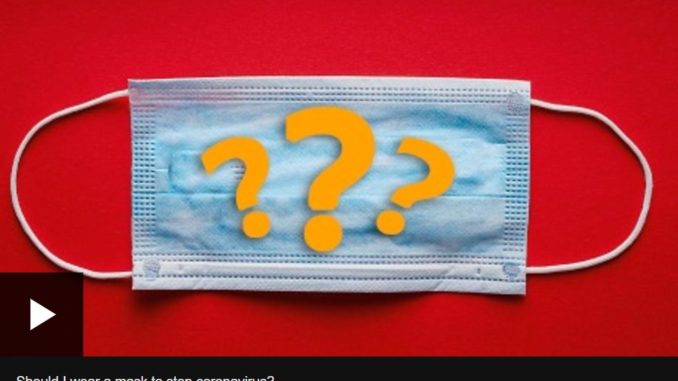
The UK government’s scientific advisers are considering what to tell ministers about whether the public should wear face masks when out.
The Scientific Advisory Group for Emergencies (Sage) has been considering issues like how to protect the supply of medical face masks – including the idea of people covering their faces with scarves or home-made masks.
But how useful are masks in stopping the spread of coronavirus?
Why doesn’t everyone wear a mask now?
The World Health Organization (WHO) has said that only two groups of people should wear protective masks, those who are:
- sick and showing symptoms
- caring for people suspected to have coronavirus
It says medical masks should be reserved for healthcare workers.
Masks are not recommended for the general public because:
- they can be contaminated by other people’s coughs and sneezes, or when putting them on or removing them
- frequent hand-washing and social distancing are more effective
- they might offer a false sense of security
The European Centre for Disease Prevention and Control agrees that medical face masks should be prioritised for healthcare workers. But it says non-surgical face masks worn by the public might help control the spread of infection by people who are contagious but do not yet have symptoms.
This might be particularly useful in busy, closed spaces, such as grocery stores, shopping centres, or when using public transport, it says.
Coronavirus is spread by droplets that can spray into the air when those infected talk, cough and sneeze. These can enter the body through the eyes, nose and mouth, either directly or after touching a contaminated object.
How might things change?
The UK government is not currently advising most people to wear masks.
However, its chief scientific adviser Sir Patrick Vallance confirmed the issue was under review, and the government’s Scientific Advisory Group for Emergencies (Sage) is set to make recommendations to ministers.
At the weekend, a group of more than 100 UK doctors wrote an open letter to The Times saying they were “alarmed at official inaction over the need for the public to wear homemade face masks”, which could be made by volunteer groups.
They said it was “illogical” to advise people to wear masks if they are showing symptoms, but not if they appear symptom-free.
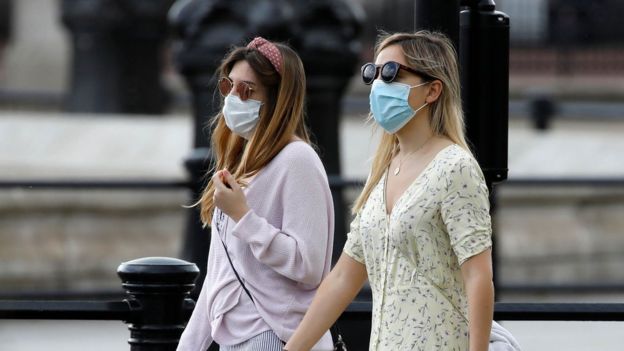
London Mayor Sadiq Khan has already urged people to use non-medical face coverings, such as a scarf or bandana, when social distancing is not possible. He said this would reduce the chances of passing on the virus.
The WHO has not changed its advice, but its special envoy Dr David Nabarro has said he believes that “some form of facial protection is going to become the norm” across society.
However, Chris Hopson, chief executive of NHS Providers, has warned that the widespread use of face masks by the public could put NHS supplies at risk.
He said that given the huge global demand for masks, there would need to be “clear evidence” to justify recommending wider use.
Where am I supposed to get a face mask?
Plenty of websites are selling medical face masks online, despite the official guidance that these should be reserved for healthcare workers.
Many High Street pharmacies do not appear to have any stocks of masks.
What about homemade face masks?
There is lots of advice on how to make face masks online.
Suggestions include using common household items, such as cotton fabric from old T-shirts or bedding.
However, homemade masks are not regulated, whereas officially-made ones have to meet safety requirements.
What do I need to know about the coronavirus?
- A SIMPLE GUIDE: How do I protect myself?
- AVOIDING CONTACT: The rules on self-isolation and exercise
- HOPE AND LOSS: Your coronavirus stories
- LOOK-UP TOOL: Check cases in your area
- VIDEO: The 20-second hand wash

What are other countries doing?
Rules on face masks have been introduced in a number of countries, for example:
- Mask use is to become compulsory on public transport in Germany, and mandatory when shopping in nearly all the country’s 16 states
- In Austria it’s compulsory to wear masks in supermarkets and pharmacies
- Residents in Lombardy, Italy’s worst-affected region, must cover their nose and mouth when outside
- In France, with some measures due to be lifted on 11 May, the government plans to give out face masks to the general public. Wearing one could become mandatory on public transport
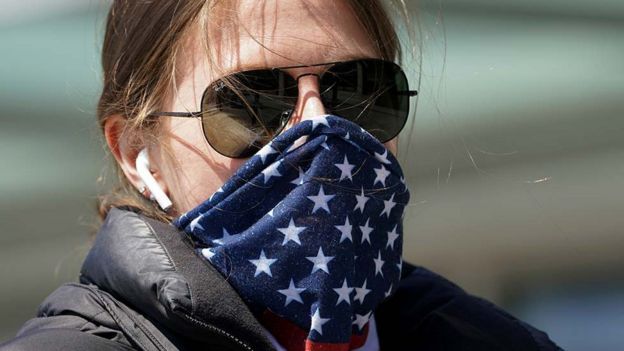
- In Portugal, masks could be compulsory in schools and on public transport
- In Canada air passengers are required to wear a non-medical mask or a face covering
- Americans are advised to wear “cloth face coverings in public settings where other social distancing measures are difficult to maintain (eg: grocery stores and pharmacies)”
What is the best type of mask?
In hospitals, different types of mask offer different grades of protection.
The most protective is an FFP3 or, alternatively, an N95 or an FFP2.
Experts do not recommend the public use these masks, which are for healthcare workers in close contact with coronavirus patients.
Other NHS staff in lower-risk situations can wear a surgical mask, latest guidelines say. That means healthcare workers within one metre of a patient with possible or confirmed Covid-19, and it includes staff working in hospitals, primary care, ambulance trusts, community care settings and care homes.
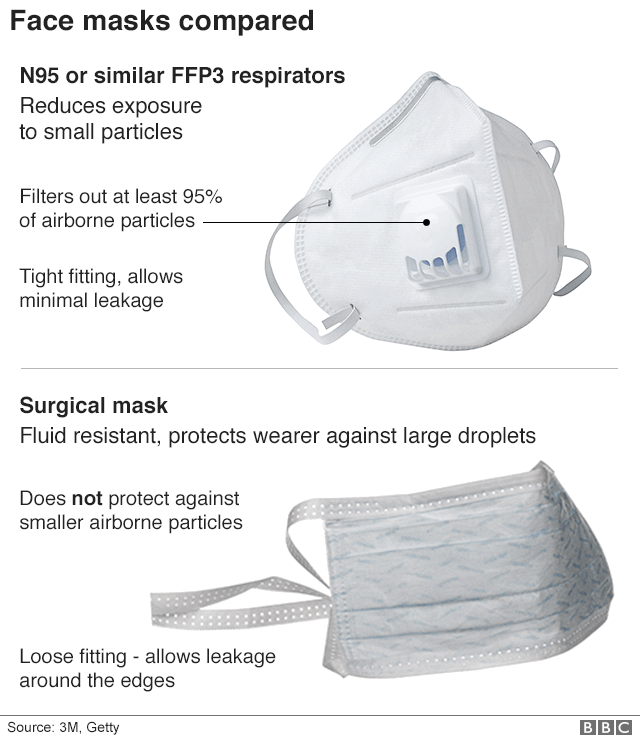
What else can protect against coronavirus?
Gloves and other protective wear are recommended for NHS staff working in places where they could encounter coronavirus.
Again, staff in the highest-risk scenarios are advised to wear fuller protection, rather than a simple apron, gloves, mask and goggles.
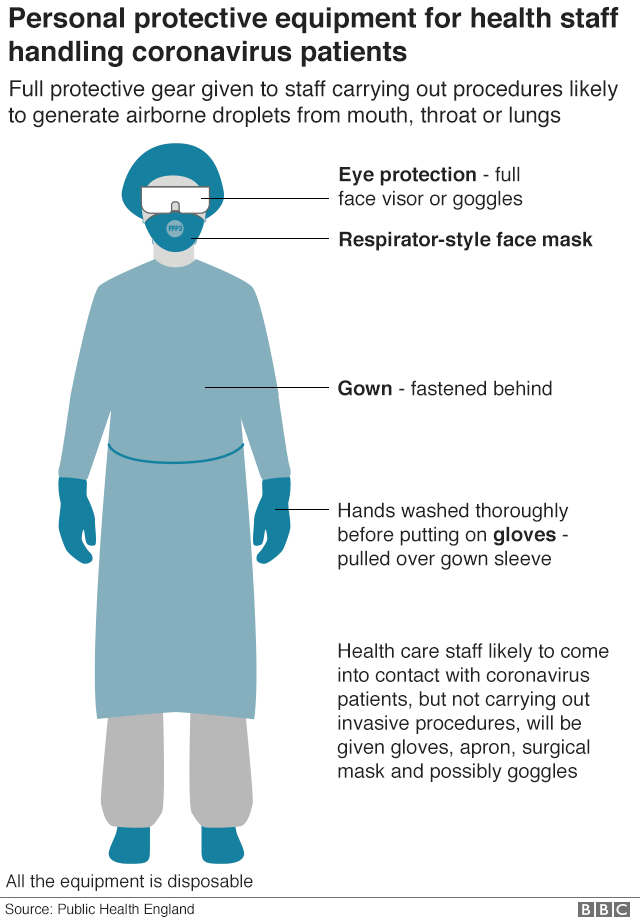
The general public are not advised to wear gloves or any other protective gear.
To protect yourself from coronavirus, the NHS recommends regular and through hand washing, covering your nose and mouth with a tissue when you cough or sneeze, and not touching your face with unwashed hands.
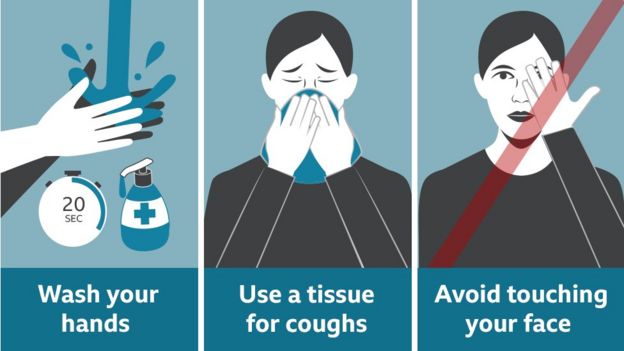


Be the first to comment